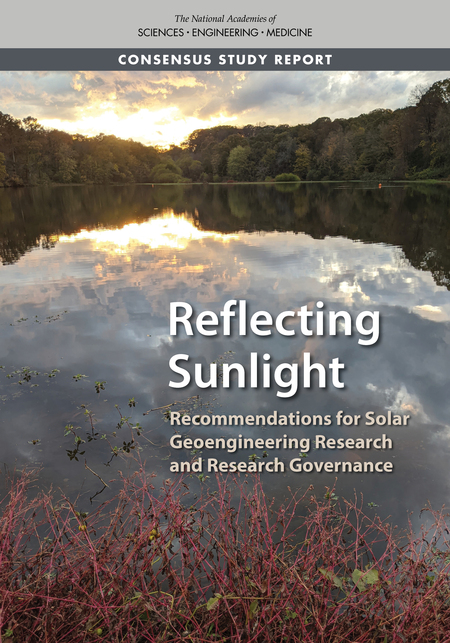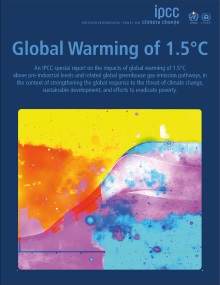International Environmental Law
The US National Academies on Solar Geoengineering Research and Governance
Four Emmett Institute scholars react to an important new report
A few of us are part of the Emmett Institute’s Geoengineering Governance Project, where we study the legal and policy issues presented by solar geoengineering and carbon dioxide removal technologies. On the former set of technologies—that is, reflecting a little incoming sunlight to cool the Earth and temporarily counteract heating from greenhouse gases—the US National …
Continue reading “The US National Academies on Solar Geoengineering Research and Governance”
CONTINUE READING“NIABYs” Obstruct Important Climate Change Research
Some activists say “not in my backyard,” but strident opponents of solar geoengineering argue “not in anyone’s backyard.”
A peculiar type of activism is manifesting with regard to solar geoengineering. This proposed set of technologies to reduce climate change has been subject to only a few outdoor experiments. One has been in the pipeline for almost a decade: The Stratospheric Controlled Perturbation Experiment (SCoPEx) would involve the launch of a balloon into the …
Continue reading ““NIABYs” Obstruct Important Climate Change Research”
CONTINUE READINGDawn of a New Era
Trump’s relentless war on the environment has finally come to an end.
A new chapter began when Joe Biden took the oath of office. That moment also marked the end of Donald Trump’s presidency, which featured efforts to roll back over a hundred environmental regulations. Biden campaigned on an ambitious plan to curb climate change, which he must now try to implement with a razor-thin control of …
Continue reading “Dawn of a New Era”
CONTINUE READINGToday Versus 2008
Despite Trump’s efforts, he couldn’t actually reset the clock to the pre-Obama era.
Obama moved us forward. Trump moved us backwards. Are we back where we began? No. Biden starts from a significantly stronger position than Obama did in 2008. In 2008, like today, the outgoing Republican President had adamantly opposed climate action, favored the oil and gas industry, and turned a cold shoulder toward environmental regulation. Trump …
Continue reading “Today Versus 2008”
CONTINUE READINGNext Steps to Save the Global Environment
A lot will need to be done to undo Trump’s harm to global cooperation. Here’s a start.
Trump’s hostility domestic environmental regulation is notorious. He also stalled or backpedaled on the international front. Here are seven steps that President Biden could take to remedy the situation. Rejoin the Paris Agreement. The U.S. needs to immediately rejoin the Paris Agreement. It also needs to update its climate target, because we can do a …
Continue reading “Next Steps to Save the Global Environment”
CONTINUE READINGThings to be Thankful For (2020 edition)
Trump has done his best to eliminate federal protection for the environment. But there have been many positive signs.
Nearly four years into the Trump Administration, we’re now accustomed to waking up every morning to learn about a new attack on the environment. It’s also been an awful year in terms of the pandemic. But there are some things to be thankful for. Here’s how I started a similar post in 2017, nearly a …
Continue reading “Things to be Thankful For (2020 edition)”
CONTINUE READINGEngineering Biological Diversity
In a new paper, I introduce the international governance of synthetic biology, gene drives, and de-extinction for conservation.
In addition to climate change — the primary topic of my academic writing — biodiversity loss is the other major global environmental challenge. Like climate change, efforts over the last three decades keep failing to meet agreed-upon objectives. And like climate change, scientists and others are considering novel technologies that would intervene in natural systems …
Continue reading “Engineering Biological Diversity”
CONTINUE READINGThe IPCC Misses the Mark on Solar Geoengineering
The Intergovernmental Panel Climate Change poorly portrays the “institutional and social constraints to deployment related to governance”
Not long ago, I re-read the top-level messages from the Intergovernmental Panel Climate Change (IPCC) on solar geoengineering’s governance issues. The Summary for Policymakers of most recent broad report, Global Warming of 1.5°C (SR1.5), says, in full: Solar radiation modification (SRM) [i.e. solar geoengineering] measures are not included in any of the available assessed pathways. …
Continue reading “The IPCC Misses the Mark on Solar Geoengineering”
CONTINUE READINGWhat Next for Climate Policy?
The election outcome is still contested. Here are three possible scenarios.
We probably won’t be sure for a while who will be our next President. The GOP will probably control the Senate but even that isn’t completely certain yet. Rather than play forecaster, I thought it would be helpful to look at how various outcomes will impact climate policy. Since we’re all suffering a lot of …
Continue reading “What Next for Climate Policy?”
CONTINUE READINGFor U.S. Climate Policy, It’s Oct. 2016 All Over Again
We knew Trump would wreck U.S. climate policy. He told us so.
Four years ago this week, I wrote about environmental stakes in the presidential election. The environmental stakes are equally high this time. If anything, Trump’s rollbacks of environmental regulations have been more thorough and severe than anticipated. He has also worked hard to open up federal lands and waters to more drilling and mining. One …
Continue reading “For U.S. Climate Policy, It’s Oct. 2016 All Over Again”
CONTINUE READING













